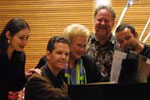Marilyn Horne & Friends

|
||
|
Welcome to the studio! Join Bill McGlaughlin and guests Marilyn Horne, Dina Kuznetsova, Troy Cook, and Brian Zeger discussing their experiences as singers, their big breaks, and their determination.
"Now more than ever, I can't see why the general audience doesn't just open its arms to singers. Look where we are right now, how much we need to be told everything that's good about us:…about humanity, about feeling, about grace, about intelligence. And I don't know anything that can make that point more powerfully than one person singing it." — Bill McGlaughlin
 Marilyn Horne
Marilyn Horne
The Marilyn Horne Foundation "really is about giving singers a chance to sing recitals. They all get to sing them in their junior or senior recitals in college or music school, but from there where to they get to do this wonderful repertory? And I know they all want to sing the great repertory. That's for sure! So when I was facing my 60th birthday—oh, to be 60 again!—I said I've got to do something to give back to this wonderful life I've had of music. And I just kept coming back to the recital ...."
 Troy Cook
Troy Cook
"Music has always just made sense to me. I began to play piano by ear since I could reach the keyboard. My mother would walk into the room and hear me playing something I'd just heard on Sesame Street. When I took piano lessons, I'd try to get my teacher to play through whatever I was learning, just once!
"I grew up in Eminence, Kentucky [population 2000]—called 'Eminence' because it was the highest point between Lexington and Louisville on the LNN Railroad. People have been incredibly supportive there. My piano teacher traveled to St. Paul to hear me sing in the Minnesota Opera's production of Marriage of Figaro [where Cook sang the title role] and my high school music director came to New York to hear my Met debut.
"When I decided I wanted to sing in operas, I'd never heard one, never seen one, never been in one. I went to a small liberal arts college, where there wasn't an opera program .... So I decided to go to the Brevard Music Center for the summer music festival there. It used to be that you'd audition and start rehearsals the next day. You'd learn the role of Tamino and then perform The Magic Flute a week later! I loved it and sang there for three summers.
"One performance I won't forget was the night I sang the role of Schaunard in the Met's familiar Zeferelli production of La Bohème. In the final fight scene I had to leap down from some height. I landed flat on my face—at the Metropolitan Opera! I could hear the audience gasp. The poor guy playing Colline was making his Met début. I just got up and went on like I'd planned it all along…"
 Dina Kuznetsova
Dina Kuznetsova
"I loved music from a young age and loved great theater and literature almost as much. For most of my life I'd thought of myself mainly as a classical pianist. I'd played from about the age of five and went on to a follow a career in it. But all along I really wanted to sing—that's where I thought I could combine everything I loved. I was always singing but never actually thought I could be a singer!
"I'm from Moscow. My aunt is the person who encouraged me to come to the United States. She was a refusenik. She eventually got to the U.S. and thought I should come. I've been here since 1987 and eventually came to Oberlin .... It was there doing a pianist-accompaniment program that my teacher Mary Schiller discovered my singing voice. Within a year I'd changed direction. Once I realized I could sing and had a real shot at it, I dropped everything else. It was my ultimate dream—but it was very scary, actually, because I'd been a pianist so long and I was such a baby at doing what I really wanted to do.
"My next big break was related to Marilyn Horne. I auditioned for her at the Music Academy of the West, and she was incredibly supportive. It was a magical summer. I got to sing Rodelinda in Handel's opera by the same name and I won the Marilyn Horne song competition. Everything came together that summer—it all began to make sense."
 Brian Zeger
Brian Zeger
"The moment I knew that the work of the Horne Foundation had taken hold was a wintry afternoon in New York when I was dashing through the halls at Juilliard to attend a meeting. There’s a corner of the floor of practice rooms favored by singers where one usually hears a mixture of vocalises, sotto voce gossip, and opera arias. That day it was all song—Schubert, Brahms, Debussy, and Britten, as I remember. Ah, I recalled, it’s the day before the Horne auditions when singers (and pianists) strive to get a coveted spot singing in a song master class.
"It was my first indication of what I now know to be true: By giving young performers real opportunities in this field, the foundation's work has transformed what is studied. Song is no longer the province of specialists: It's an endless trove there to be enjoyed for performers and audiences alike."








